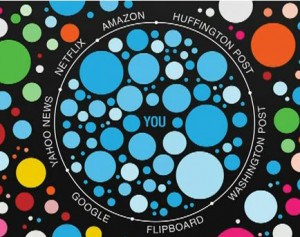I listened to a brilliant lecture with Q&A on iTunes U last night by Eli Pariser, the author of The Filter Bubble. He was talking about the ideas in his book as part of a London School of Econmics Summer 2011 Public Lectures and Events. (Here’s the iTunes U URL [1 hr 20 min]. He’s also done a shorter TED talk.)
I won’t paraphrase his ideas … well, OK, in part: The internet is being filtered by commercial entities like Facebook, Google, Yahoo etc in order to make the results we see more ‘relevant’ to our interests. But the effect of that is to ‘hide’ information and viewpoints that don’t fit or support our current view of things. These businesses are deciding what information to show us — based on our browsing and searching behaviour, which they track closely — and tailoring the world we see in a way that gives us a distorted, filtered view … but we don’t know in what way it’s been angled.
He discussed the psychology … the filter effect means we’ll see more things that we’re familiar with and we agree with — and less that might invalidate our existing views (about 17.30 in the LSE lecture):
The neuro science is now good enough that we can almost pinpoint these little bursts of pleasure that we all get in our brains when we’re presented with information that confirms what we already thought was true. And conversely it’s nearly universal that when we’re presented with information that challenges what we believed, that makes us question whether we were right, we all get cranky. That’s just sort of the way it goes.
And the question is: If you could build a program that was able to give people more of those dopamine bursts per minute, more little bursts of pleasure per minute, why would you ever show them the stuff that makes them cranky? Why would you ever show them the stuff that challenges what they think and suggests that maybe we don’t all have the answers?
Given that insight, and reflecting on a conversation I saw in a comments stream here and how upset people have been at some of my own online comments elsewhere, I nodded soberly in agreement.
Yeah, I can see why someone coming along and disagreeing with, say, someone else’s expressed opinion or point of view, or laying out an argument that questioned another person’s thinking or behaviour or labeling of ‘opponents’ in harsh derogatory terms … might cause some crankiness.
That’s just human nature. How we respond to information that doesn’t merely confirm our views — that is a test of character.
– P
Here’s Pariser’s list of Ten things you can do to to pop your Filter Bubble



[…] selected DuckDuckGo — largely based on their promise (read this) not to track and not to ‘fliter bubble‘ […]